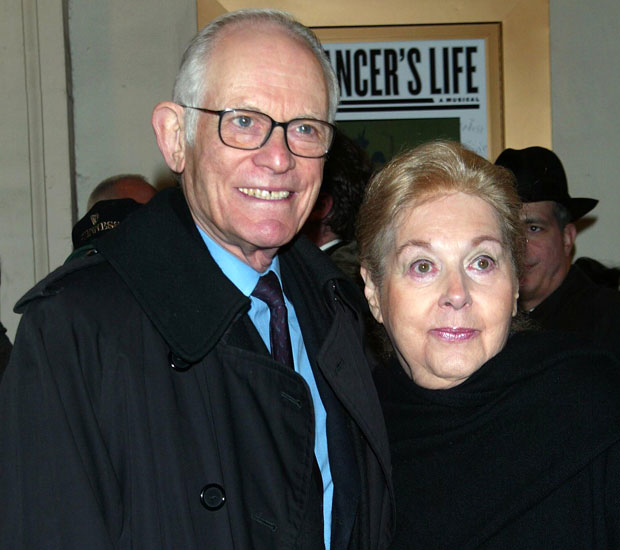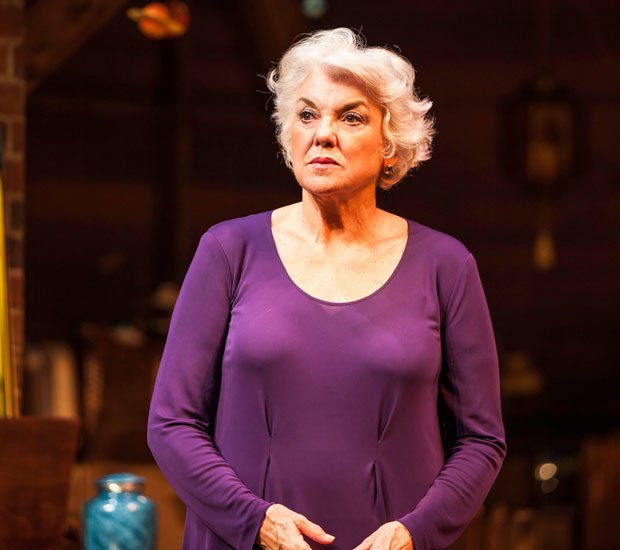Lyricist Alan Bergman Keeps the Music Playing
With his wife, Marilyn, Bergman has written celebrated songs, including “The Way We Were.” Their work is now featured at the Geffen Playhouse in ”Chasing Mem’ries”.
Alan Bergman is responsible for the lyrics to some of the most famous songs ever written. Since 1956, he has collaborated with his wife, Marilyn, and a variety of well-known composers on such tunes as "The Way We Were" (with Marvin Hamlisch), "The Windmills of Your Mind" (with Michel Legrand), and "You Don't Bring Me Flowers" (with Neil Diamond).
Now, their illustrious catalogue has been turned into "a different kind of musical," providing the basis for Josh Ravetch's Chasing Mem'ries, starring Tyne Daly, at the Geffen Playhouse. The story of a widow reliving old memories in her attic after her husband's death, the piece features five new Bergman tunes and a host of classics. Alan, 92, and Marilyn, 88, have been heavily involved in the process. Here, Alan gives us a preview of the show (and talks on behalf of Marilyn, who had laryngitis), while looking back on where it all began.

(© Joseph Marzullo)
What is Chasing Mem'ries about?
Josh Ravetch said he wanted to write a play. Together, we considered how our old songs like "Where Do You Start?" and "Little Boy Lost" would be used, and then wrote five new songs. The show is the story of a recent widow, and it all takes place in her attic. She's going through the memories of her whole life and struggling with her next step after a loving marriage. She has a son, and he's a product of this generation, where it's very hard for them to make a commitment. He has a problem with his next step too. Tyne Daly is great; Robert Forster and Scott Kradolfer are terrific. They're bringing it to life, and we're hearing what we want to hear. And the audience is getting it!
Going all the way back, how did you and Marilyn become songwriters?
All I ever wanted to do was write songs. The first piece of sheet music I ever bought was a song called "Lost," and one of the writers was Johnny Mercer. When I went to graduate school at UCLA, I met him and he became my mentor. I wouldn't be here if it wasn't for Johnny. Marilyn went to the High School of Music and Art [in New York], and in the afternoons, she would work with a lyric writer named Bob Russell, who wrote a lot of things with Duke Ellington. Bob didn't play piano, so Marilyn would go to his house and play the melodies while he wrote. Those things rub off.
How were you and Marilyn introduced, and what was the first song you wrote together?
I was writing with the composer Lew Spence in the morning, and Marilyn was writing with him in the afternoon. One day he decided to introduce his AM lyric writer to his PM lyric writer. The first song we wrote together was called "I Never Knew What Hit Me." It was not very good, but we enjoyed the process. That was 1956, and we've been writing together ever since.

(© Chris Whitaker)
Do you have any favorites among your extensive catalogue?
A lot of our favorites come from the assignment. For instance: "What Are You Doing the Rest of Your Life?" The writer-director [of the 1969 film The Happy Ending] Richard Brooks called us and said he needed a song. He said the first time we hear it, it's behind a love montage; a couple is very much in love and graduating from college. Years later, they're married and the wife is an alcoholic, the husband a workaholic, and she decides to leave him. She goes to her favorite bar, puts a dime in the jukebox, and that same song will play, and we can't change a word. He said it has to be ironic. That's one of our favorites, because it was a great challenge.
"The Windmills of Your Mind" is another title. And, of course, we love "The Way We Were," performed by probably the best singer in the world. We were very lucky with the composers, working with people like Michel Legrand and Marvin Hamlisch.
Is it always a thrill when you hear your song playing, either on the radio or in public places?
Oh, absolutely. An additional kick is when we're in Paris or Prague or someplace like that, and we hear our songs being sung. A long time ago, we did a concert in Cuba. The people in the audience in the Karl Marx Theatre, 6,000 people, knew all the words to the songs, which was thrilling. Music travels easily.








